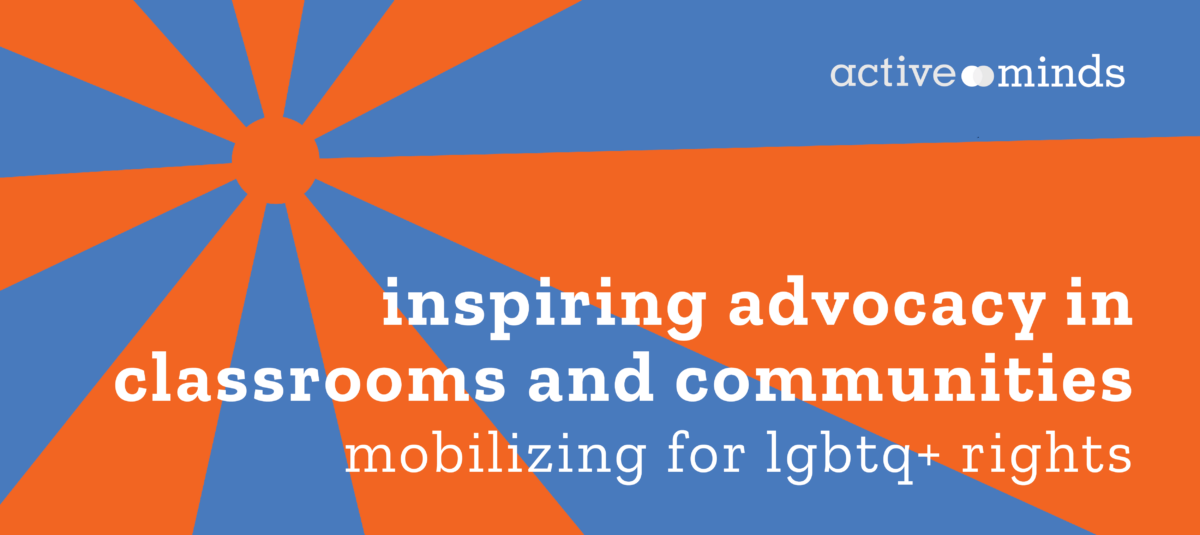Recently, Active Minds shared about the importance of advocacy and policy in championing LGBTQ+ rights and creating a world where everyone feels safe, accepted, and welcome to live authentically. A clear connection exists between ensuring that right and creating a world where mental health is valued and prioritized. That kind of change can’t happen overnight, but that doesn’t mean we can’t play a part in making it happen sooner than later. We all have a key role in mental health advocacy, and I’m excited to share with you how you can mobilize those around you to fight for a more just, and thus, a more healthy world. This is your guide to organizing your peers, friends, and classmates around mental health policy.
This year at West Virginia University, I led my Active Minds Chapter, in collaboration with a student organization for women in politics and government, to highlight the advocacy process in our state legislature. We discussed different definitions of advocacy, how a bill becomes a law, and what bills had been introduced in the state government that would affect mental health. As a Chapter, we knew this event was necessary because the power of youth and young adult advocacy is underrated. Your voice is the most powerful tool for bringing about lasting change, and knowing how to harness that power is what will lead to the implementation of effective mental health research and policy. The policies that are foundational to our communities and college campuses were crafted decades, sometimes centuries, ago at a time when mental health was nearly nonexistent in vocabulary. As future leaders of our communities, we can begin the conversation now to push the needle toward progress.
By now, you are likely familiar with the snail’s pace of government. For some, access to mental health resources and education at the government’s pace would be too late. That is why it is the responsibility of young adult advocates, including Active Minds Chapter members, to be on the frontlines of ensuring that change comes more immediately. Advocacy is more robust in numbers, and using creative methods to mobilize your peers will make the most significant impact. At the end of the event, attendees took the time to write a handwritten letter to a state lawmaker concerning one of the bills we discussed. It was not long before some of those lawmakers wrote back with appreciation for voicing those concerns.
I know from first-hand experience that mobilizing students to tackle an issue can sometimes feel tedious, especially if you or your Chapter have not had much experience in this area. Here are a few tips that I have used to guide taking action around mental health policy:
- Maintain a consistent social media presence. Being a recurring sight on your peers’ social media feeds will make them remember your event and make them more likely to show up and share.
- Lean into your network. Getting a group of people together from your own circle might be difficult, much less getting the word out to strangers. Collaborate with other organizations on campus or within your community to increase your reach and diversify your perspective.
- Make your call to action tangible. College students are on a budget, so a trip to the state capitol or Washington, D.C. might be out of the question. Instead, hold space for letter writing or phone banking at a meeting to put thoughts into action.
Perhaps most importantly, be a respectful advocate. Lawmakers and administrators may be reluctant to listen, let alone take action, at first. Do not let this get you down or get a rise out of you. Channel this energy into developing a strategy and ask to meet with the policymaker to reach a mutual understanding. Sometimes bias clouds a great idea, and a heart-to-heart conversation can clear up any confusion. Even if you fail to get a law passed or a policy changed on your campus the first time, you don’t have to (nor should you) give up. Consistency will show policymakers that what you advocate for is important to you and your chapter. Who knows — maybe extra funding has opened up since you last spoke, or key priorities have changed!




